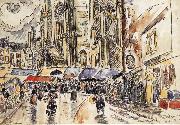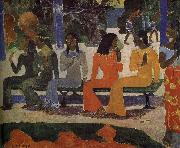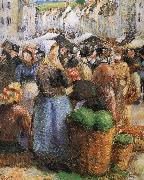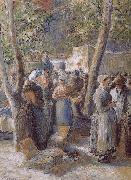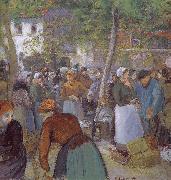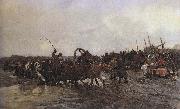Wholesale Oil Painting No Minimum |
|||||||||||
|
|
|||||||||||

|
|||||||||||
|
|
|
||||||||
Paul Signac1863-1935 French Paul Signac Galleries Paul Victor Jules Signac was born in Paris on November 11, 1863. He followed a course of training in architecture before deciding at the age of 18 to pursue a career as a painter. He sailed around the coasts of Europe, painting the landscapes he encountered. He also painted scenes of cities in France in his later years. In 1884 he met Claude Monet and Georges Seurat. He was struck by the systematic working methods of Seurat and by his theory of colours and became Seurat's faithful supporter. Under his influence he abandoned the short brushstrokes of impressionism to experiment with scientifically juxtaposed small dots of pure colour, intended to combine and blend not on the canvas but in the viewer's eye, the defining feature of pointillism. Many of Signac's paintings are of the French coast. He left the capital each summer, to stay in the south of France in the village of Collioure or at St. Tropez, where he bought a house and invited his friends. In March 1889, he visited Vincent van Gogh at Arles. The next year he made a short trip to Italy, seeing Genoa, Florence, and Naples. The Port of Saint-Tropez, oil on canvas, 1901Signac loved sailing and began to travel in 1892, sailing a small boat to almost all the ports of France, to Holland, and around the Mediterranean as far as Constantinople, basing his boat at St. Tropez, which he "discovered". From his various ports of call, Signac brought back vibrant, colourful watercolors, sketched rapidly from nature. From these sketches, he painted large studio canvases that are carefully worked out in small, mosaic-like squares of color, quite different from the tiny, variegated dots previously used by Seurat. Signac himself experimented with various media. As well as oil paintings and watercolours he made etchings, lithographs, and many pen-and-ink sketches composed of small, laborious dots. The neo-impressionists influenced the next generation: Signac inspired Henri Matisse and Andr?? Derain in particular, thus playing a decisive role in the evolution of Fauvism. As president of the Societe des Artistes Ind??pendants from 1908 until his death, Signac encouraged younger artists (he was the first to buy a painting by Matisse) by exhibiting the controversial works of the Fauves and the Cubists. |
||||||||
|
|
||||||||
Market
Market Painting ID:: 37005 |
mk115
1927
27.5x39.5cm
mk115 1927 27.5x39.5cm |
|||||||
|
|
||||||||
Jules PascinBulgarian-born French Expressionist Painter, 1885-1930,American painter, draughtsman and printmaker of Bulgarian birth, active in France. He attended secondary school in Vienna, returning in 1901 to Bucharest, where his family had settled, and working briefly in the office of his father's grain-merchandizing business. He was, however, already becoming passionately interested in drawing, for which he showed precocious talent. At the age of 16 he became the lover of a woman who ran a brothel and was allowed by her to draw the residents. In 1903 he moved to Munich, where he attended the art school run by Moritz Heymann. |
||||||||
|
|
||||||||
|
|
Market
Market Painting ID:: 51554 |
mk219
paper
20x10cm
1910
mk219 paper 20x10cm 1910 |
||||||
|
|
||||||||
Paul GauguinFrench 1848-1903 Paul Gauguin Art Locations (born June 7, 1848, Paris, France ?? died May 8, 1903, Atuona, Hiva Oa, Marquesas Islands, French Polynesia) French painter, sculptor, and printmaker. He spent his childhood in Lima (his mother was a Peruvian Creole). From c. 1872 to 1883 he was a successful stockbroker in Paris. He met Camille Pissarro about 1875, and he exhibited several times with the Impressionists. Disillusioned with bourgeois materialism, in 1886 he moved to Pont-Aven, Brittany, where he became the central figure of a group of artists known as the Pont-Aven school. Gauguin coined the term Synthetism to describe his style during this period, referring to the synthesis of his paintings formal elements with the idea or emotion they conveyed. Late in October 1888 Gauguin traveled to Arles, in the south of France, to stay with Vincent van Gogh. The style of the two men work from this period has been classified as Post-Impressionist because it shows an individual, personal development of Impressionism use of colour, brushstroke, and nontraditional subject matter. Increasingly focused on rejecting the materialism of contemporary culture in favour of a more spiritual, unfettered lifestyle, in 1891 he moved to Tahiti. His works became open protests against materialism. He was an influential innovator; Fauvism owed much to his use of colour, and he inspired Pablo Picasso and the development of Cubism. |
||||||||
|
|
||||||||
|
|
Market
Market Painting ID:: 57382 |
mk256 1892 years painting 73 x 92 cm mk256 1892 years painting 73 x 92 cm |
||||||
|
|
||||||||
Camille PissarroCaribbean-born French Pointillist/Impressionist Painter, ca.1830-1903 .Painter and printmaker. He was the only painter to exhibit in all eight of the Impressionist exhibitions held between 1874 and 1886, and he is often regarded as the 'father' of the movement. He was by no means narrow in outlook, however, and throughout his life remained as radical in artistic matters as he was in politics. Thad?e Natanson wrote in 1948: 'Nothing of novelty or of excellence appeared that Pissarro had not been among the first, if not the very first, to discern and to defend.' The significance of Pissarro's work is in the balance maintained between tradition and the avant-garde. Octave Mirbeau commented: 'M. Camille Pissarro has shown himself to be a revolutionary by renewing the art of painting in a purely working sense; |
||||||||
|
|
||||||||
|
|
market
market Painting ID:: 57860 |
mk259 1885 Oil on canvas years 46 x 38 cm mk259 1885 Oil on canvas years 46 x 38 cm |
||||||
|
|
||||||||
Camille PissarroCaribbean-born French Pointillist/Impressionist Painter, ca.1830-1903 .Painter and printmaker. He was the only painter to exhibit in all eight of the Impressionist exhibitions held between 1874 and 1886, and he is often regarded as the 'father' of the movement. He was by no means narrow in outlook, however, and throughout his life remained as radical in artistic matters as he was in politics. Thad?e Natanson wrote in 1948: 'Nothing of novelty or of excellence appeared that Pissarro had not been among the first, if not the very first, to discern and to defend.' The significance of Pissarro's work is in the balance maintained between tradition and the avant-garde. Octave Mirbeau commented: 'M. Camille Pissarro has shown himself to be a revolutionary by renewing the art of painting in a purely working sense; |
||||||||
|
|
||||||||
|
|
market
market Painting ID:: 60663 |
mk259 1887 Oil on canvas 31 x 24 cm mk259 1887 Oil on canvas 31 x 24 cm |
||||||
|
|
||||||||
Camille PissarroCaribbean-born French Pointillist/Impressionist Painter, ca.1830-1903 .Painter and printmaker. He was the only painter to exhibit in all eight of the Impressionist exhibitions held between 1874 and 1886, and he is often regarded as the 'father' of the movement. He was by no means narrow in outlook, however, and throughout his life remained as radical in artistic matters as he was in politics. Thad?e Natanson wrote in 1948: 'Nothing of novelty or of excellence appeared that Pissarro had not been among the first, if not the very first, to discern and to defend.' The significance of Pissarro's work is in the balance maintained between tradition and the avant-garde. Octave Mirbeau commented: 'M. Camille Pissarro has shown himself to be a revolutionary by renewing the art of painting in a purely working sense; |
||||||||
|
|
||||||||
|
|
Market
Market Painting ID:: 60677 |
mk259 1885 years of water color paper gum chalk 82.2 x 82.2 cm mk259 1885 years of water color paper gum chalk 82.2 x 82.2 cm |
||||||
|
|
||||||||
Jozef Chelmonski(November 7, 1849 -- April 6, 1914) was a Polish painter. Chełmonski was born in the village of Boczki near Łowicz in central Congress Poland, Russian Empire. His first drawing teacher was his father (a small leaseholder and administrator of Boczki village). After finishing high school in Warsaw, he studied in Warsaw Drawing Class (1867--1871) and took private lessons from Wojciech Gerson. From 1871 to 1874 Chełmonski lived in Munich. He worked with Polish painters assembled around Jozef Brandt and Maksymilian Gierymski. He also had studied for a few months at the academy of H. Anschutz and A. Strahuber. In 1872 and 1874 Chełmonski visited the Polish territories (Poland as a country did not exist then), Tatra Mountains and Ukraine. His first paintings were done under the influence of Gerson. The works that followed were landscapes and villages. In 1875 Chełmonski went to Paris, where he had many important exhibitions and became known to the art scene. With many orders, the artistic level of his paintings decreased. From 1878 to 1887 Chełmonski visited Poland, Vienna and Venice. In 1887 he returned to Poland and in 1889 settled in Kuklawka Zarzeczna village. Contact with his homeland and nature revealed quality in his artworks. From that time are the best liked Chełmonski's paintings such as Partridge on the Snow, The Storks or Before Thunderstorm. Chełmonski represented the trend in art called "Polish Patriotic Painting". He died in Kuklawka near Grodzisk Mazowiecki in 1914. |
||||||||
|
|
||||||||
|
|
Market
Market Painting ID:: 67808 |
Oil on canvas, 57.5x67.5, Kosciuszko Foundation, New York Oil on canvas, 57.5x67.5, Kosciuszko Foundation, New York |
||||||
|
|
||||||||
|
Jozef Chelmonski (November 7, 1849 -- April 6, 1914) was a Polish painter. Chełmonski was born in the village of Boczki near Łowicz in central Congress Poland, Russian Empire. His first drawing teacher was his father (a small leaseholder and administrator of Boczki village). After finishing high school in Warsaw, he studied in Warsaw Drawing Class (1867--1871) and took private lessons from Wojciech Gerson. From 1871 to 1874 Chełmonski lived in Munich. He worked with Polish painters assembled around Jozef Brandt and Maksymilian Gierymski. He also had studied for a few months at the academy of H. Anschutz and A. Strahuber. In 1872 and 1874 Chełmonski visited the Polish territories (Poland as a country did not exist then), Tatra Mountains and Ukraine. His first paintings were done under the influence of Gerson. The works that followed were landscapes and villages. In 1875 Chełmonski went to Paris, where he had many important exhibitions and became known to the art scene. With many orders, the artistic level of his paintings decreased. From 1878 to 1887 Chełmonski visited Poland, Vienna and Venice. In 1887 he returned to Poland and in 1889 settled in Kuklawka Zarzeczna village. Contact with his homeland and nature revealed quality in his artworks. From that time are the best liked Chełmonski's paintings such as Partridge on the Snow, The Storks or Before Thunderstorm. Chełmonski represented the trend in art called "Polish Patriotic Painting". He died in Kuklawka near Grodzisk Mazowiecki in 1914. Market Oil on canvas, 57.5x67.5, Kosciuszko Foundation, New York |
||||||||
|
|
||||||||
|
Prev Next
|
||||||||
|
|
||||||||
|
Related Paintings to Jozef Chelmonski :. |
||||||||
|
|
||||||||
|
CONTACT US |
